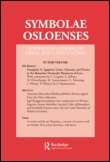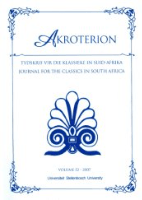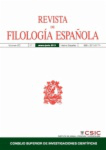
Cuadernos de Filologia Clasica-Estudios Latinos
metrics 2024
Innovating Research in Latin Literature and Linguistics
Introduction
Cuadernos de Filologia Clasica-Estudios Latinos is a distinguished academic journal dedicated to the field of classical philology, with a particular emphasis on Latin studies. Published by UNIV COMPLUTENSE MADRID, SERVICIO PUBLICACIONES, this journal serves as a vital platform for scholars, educators, and students interested in the rich legacy of Latin literature and its linguistic intricacies. The journal, identifiable by its ISSN 1131-9062 and E-ISSN 1988-2343, aims to foster scholarly dialogue through the publication of innovative research articles, critical essays, and book reviews that advance knowledge within this specialized discipline. Although it operates under a non-open access model, its contributions are invaluable, enriching the academic community's understanding of classical texts and their contemporary significance. Through its rigorous scholarship and commitment to excellence, Cuadernos de Filologia Clasica-Estudios Latinos positions itself as an essential resource for anyone invested in the study of classical languages and literatures.
Metrics 2024
 -
- 0.20
0.20 0.20
0.20 -
-Metrics History
Rank 2024
JCI (Web Of Science)
Quartile History
Similar Journals

Symbolae Osloenses
Navigating the Nuances of Classical HeritageSymbolae Osloenses, published by TAYLOR & FRANCIS LTD, is a distinguished journal in the field of Classics, with a rich history dating back to its inception in 1922. This UK-based journal has continuously contributed to the scholarly discourse surrounding ancient cultures, languages, and literature, making it a crucial resource for researchers, educators, and students alike. Though it operates under a subscription model, its impact on the academic community is underscored by its recent inclusion in the 2023 Scopus rankings, where it holds a respectable position in the 65th percentile among its peers. With decades of published research spanning from 1924 to 2023, Symbolae Osloenses remains committed to fostering robust academic dialogue and advancing knowledge in the Classics, catering to a diverse readership seeking to explore the nuances of classical studies.

Eikasmos-Quaderni Bolognesi di Filologia Classica
Illuminating the Intersections of Language and ClassicsEikasmos-Quaderni Bolognesi di Filologia Classica is a distinguished journal that focuses on the fields of Classics, Linguistics, and Language, published by PATRON EDITORE S R L in Italy. With its ISSN 1121-8819, the journal has been a vital platform for the dissemination of scholarly work from 2011 until 2021, contributing significantly to the dialogue within these disciplines. Although recognized in the lower quartiles (Q4) of various categories within Scopus, including Classics and Linguistics, and having ranked in the 37th and 19th percentiles respectively, Eikasmos stands as an invaluable resource for researchers, academics, and students committed to exploring classical philology and its interconnections with modern linguistic studies. The absence of an open access model underscores the importance of institutional support in accessing this scholarly work, which continues to enrich the academic landscape of classical studies.

Akroterion-Journal for the Classics in South Africa
Illuminating the Classics: A South African PerspectiveAkroterion: Journal for the Classics in South Africa is a premier open-access journal dedicated to advancing the study of classical antiquity within the context of South Africa and beyond. Founded in 1990 and published by SUNJOURNALS, this journal serves as a vital platform for the dissemination of scholarly articles, reviews, and critical perspectives that delve into the rich tapestry of classical literature, history, and culture. Based in Stellenbosch, South Africa, it provides international accessibility for researchers and scholars alike, enhancing the global discourse on classical studies. Despite its classification in the Q4 quartile of Classics and the 17th percentile of Scopus rankings, Akroterion remains committed to fostering innovative research and nurturing emerging voices in the field. By offering an open-access model, it ensures that valuable academic contributions reach a wider audience, empowering enthusiasts and professionals to explore the timeless relevance of classical studies today.

Cadernos de Letras da UFF
Innovating Literary Studies with Open Access ScholarshipCadernos de Letras da UFF is a prominent academic journal published by the Department of History at the Federal University of Fluminense in Brazil. Since its transition to Open Access in 2014, it has fostered a spirit of collaboration and dissemination in the field of Literature and Linguistics, welcoming contributions that explore various aspects of literary studies, historical literature contexts, and linguistic phenomena. With a commitment to quality and academic rigor, the journal serves as a vital resource for scholars, practitioners, and students engaged in the humanities. The journal is dedicated to the advancement of knowledge through innovative research and critical analyses, making it an essential platform for sharing ideas with a global audience. The journal is based in Niterói, RJ, Brazil, and is indexed in various academic databases, enhancing its visibility and impact within the scholarly community.

Acta Classica
Exploring the Rich Tapestry of Ancient CivilizationsActa Classica is a distinguished journal dedicated to the field of Classics, published by the Department of English in Classical Languages at the University of Free State, South Africa. With its ISSN 0065-1141 and E-ISSN 2227-538X, this journal has been a pivotal platform for scholarly discourse since its inception in 1973, notably converging and evolving significantly in its content from 2010 to 2023. Although it currently holds a Q4 classification in Classics, its Scopus ranking at #88 out of 170 in the Arts and Humanities reflects its relevance in academic circles, with a 47th percentile standing. The journal aims to publish high-quality research articles, reviews, and critical essays that not only explore the rich tapestry of ancient civilizations but also contribute to contemporary understandings of classical languages and literature. While its content is not openly accessible, Acta Classica remains an essential resource for researchers, professionals, and students who seek to deepen their knowledge and engagement with Classical studies.

Rivista di Filologia e di Istruzione Classica
Cultivating Understanding in Humanities through ClassicsRivista di Filologia e di Istruzione Classica is a distinguished academic journal published by LOESCHER EDITORE, dedicated to advancing the fields of Classics and Linguistics. Based in Italy, this journal serves as a vital platform for original research, critical analysis, and scholarly discussions that enrich our understanding of classical texts and educational methodologies in the humanities. With its unique focus on the intricate relationship between classical literature and language, the journal aims to facilitate discourse among researchers, educators, and students alike. Although categorized in the fourth quartile in both Classics and Linguistics, it provides an essential venue for scholars seeking to disseminate their findings and engage with contemporary academic debates. The journal is indexed in various databases, though recent coverage in Scopus has been discontinued. Researchers interested in exploring the complex layers of classical philology and instructional practices are encouraged to contribute to and engage with the innovative scholarship presented in this journal.

Cuadernos de Filologia Clasica-Estudios Griegos e Indoeuropeos
Advancing the Study of Classics and LinguisticsCuadernos de Filologia Clasica-Estudios Griegos e Indoeuropeos, published by Universidad Complutense de Madrid, serves as a vital platform in the fields of Classics and Linguistics. With an ISSN of 1131-9070 and an E-ISSN of 1988-2637, this journal showcases rigorous academic research that spans both Greek studies and Indo-European linguistics. Recognized within the Q1 quartile in Classics and the Q2 quartile in Linguistics and Language, it highlights its standing among peers in these disciplines, particularly reflecting its commitment to advancing scholarly conversation. Though currently lacking in Open Access options, its emphasis on quality content ensures it maintains an intellectual influence, as evidenced by its ranking of #112 in Classics and efforts to engage researchers and students alike. The journal's coverage from 2011 to 2024 positions it as a rich historical resource, while its address in Madrid places it at the heart of European classical studies. By offering insights into the fundamental aspects of language, literature, and ancient cultures, Cuadernos de Filologia Clasica remains a critical resource for those seeking to deepen their understanding of the classical world and its enduring linguistic legacies.

Auster
Fostering innovation through open-access scholarship.Auster is a prominent open-access journal dedicated to advancing interdisciplinary research within the fields of Humanities and Educational Sciences. Published by the esteemed Universidad Nacional de La Plata, specifically by the Faculty of Humanities and Educational Sciences, this journal has been a cornerstone for scholarly discourse since its establishment in 1996. With an ISSN of 1514-0121 and an E-ISSN of 2346-8890, Auster ensures wide accessibility to innovative research and critical analyses. Its commitment to open access fosters an inclusive academic environment, allowing researchers, students, and professionals in Argentina and beyond to engage with high-quality content that stimulates new ideas and interdisciplinary collaboration. The journal strives to publish timely, relevant articles that explore contemporary challenges in humanities and education, thereby positioning itself as an essential resource for anyone invested in these dynamic fields.

PHOENIX-THE JOURNAL OF THE CLASSICAL ASSOCIATION OF CANADA
Championing Rigorous Research in ClassicsPHOENIX - THE JOURNAL OF THE CLASSICAL ASSOCIATION OF CANADA is a distinguished academic journal published by the Classical Association of Canada, dedicated to advancing the study of classical antiquity and its enduring influence on contemporary society. With an ISSN of 0031-8299 and an E-ISSN of 1929-4883, PHOENIX serves as a pivotal platform for researchers, educators, and students in the field of classics. Although without open access provisions, the journal is noted for its rigorous peer-review process, ensuring the publication of high-quality scholarship that meets the academic community's standards. With its back issues archived since 2002, the journal is supported by a strong reputation, evidenced by its Scopus ranking in the 80th percentile in the Arts and Humanities - Classics category. Based in Toronto, Ontario, it continues to foster scholarly dialogue and exploration of themes ranging from ancient texts to contemporary interpretations of classical traditions. By prioritizing diverse contributions that enhance our understanding of classical studies, PHOENIX remains a vital resource for anyone engaged in the rich and varied exploration of the ancient world.

REVISTA DE FILOLOGIA ESPANOLA
Pioneering Discoveries in the Art of Language and LiteratureREVISTA DE FILOLOGIA ESPANOLA is a distinguished academic journal dedicated to the fields of linguistics and literature, published by the CONSEJO SUPERIOR INVESTIGACIONES CIENTIFICAS (CSIC) since 1954, and has been an Open Access journal since its inception. Situated in Madrid, Spain, this journal has emerged as a crucial platform for the dissemination of scholarly research, with notable rankings including Q2 in Linguistics and Language and Q1 in Literature and Literary Theory as of 2023. The journal's commitment to fostering academic dialogue is reflected in its impressive Scopus rankings, including a 79th percentile in the Arts and Humanities for Literature and Literary Theory. Covering a wide range of topics from linguistic theory to literary critique, REVISTA DE FILOLOGIA ESPANOLA is essential reading for researchers, professionals, and students alike, providing valuable insights and cutting-edge research in the ever-evolving landscape of Spanish philology.